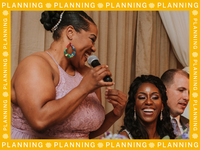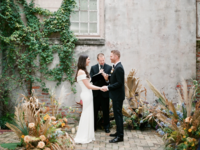Having a Jewish Wedding? A Guide for the Groom

Here's a little guide to the wedding minhag (customs) for the chatan (that's you, groom).
The Wedding Bands
That's rings, not music. For a marriage to be legal, Jewish law requires the groom to give the bride something worth at least a penny. For 1,400 years, Jewish grooms have accomplished this prerequisite with a ring. Not just any ring, though; it must be a simple band without piercings or precious stones. Its smooth, circular shape represents the marriage as an unbroken union. Don't worry -- you can still get the ring engraved. Go ahead and put all the mushy stuff you want inside.
Haray What?
We've got a little homework for you. As you place the ring on your sweetie's finger, you will recite the Haray Aht, a pronouncement from the Talmud. You are expected to memorize the sentence (although your rabbi may whisper it just in case you forget). Here's your assignment in Aramaic and English: "Haray aht m'kudeshhet li b'taba'at zu k'dat Moshe v'Yisrael," or, "By this ring you are consecrated to me, as my wife, in accordance with the traditions of Moses and Israel." Here's a little-known fact to impress the rabbi: There are 32 letters in the phrase, and the number 32 in Hebrew is written with the same letters that spell the word "heart." Thus, you are symbolically giving your heart as you say the words. Don't forget the ring is first placed on the bride's right index finger, not her ring finger (she can switch it later). This custom springs from the ancient belief that the right index finger is directly connected to the heart.
And the Groom Wore...
The bride isnt the only one who wears white. Jewish grooms traditionally wear a short, white linen robe, known as a kittel, during the wedding ceremony. The color symbolizes the couple's rebirth as they begin their new life together with a clean slate.
Aufruf
Jewish to-be-weds are publicly honored with an aufruf, Yiddish for "calling up." On the Sabbath before the wedding (or the Sabbath after the wedding for Sephardi) you are given the honor of reciting the blessings before and after the first Torah reading. Sephardic grooms also read a passage from Genesis in which Abraham sends his servant to find a suitable wife for his son Isaac. A congregant usually reads the parasha, or Torah portion, but you can make arrangements in advance to read a portion -- and really impress your new in-laws with your Hebrew skills. If you pass on the parasha, you just need to refresh your memory of the blessings -- the same ones you said at your Bar Mitzvah. It might even feel like Bar Mitzvah deja vu as you return to your seat and the congregation pelts you with flying nuts and candy. Watch out, though, you're all grown up this time -- so no one's going to take it easy on you.



The Groom's Table
Immediately before the wedding, the groom and his male family and friends gather at the tish, or table. Traditionally, the groom attempts to present a lecture on the week's Torah portion, while his friends and family heckle and interrupt him to prevent him from finishing. The tish should be humorous and fun, which relaxes the invariably nervous groom before the wedding. If you're uncomfortable with public speaking, recruit your bride and do the tish together.
Smashing the Glass
Here it comes, the shining moment: your turn to stomp the glass. This ritual has countless meanings: It scares away demons, recalls the fall of the Temple, and reminds us that great joy suddenly can be shattered. The broken glass also represents marriages permanence: Once done, it cannot be undone (just like the glass that cannot be put back together). It's also the official signal to shout, "Mazel Tov!"
Hora, Hora, Hora
Well, chatan, your obligations are almost over -- only one remains. You will be lifted on a chair, high above the crowd, before the night is over. It's unavoidable. Take comfort, though; your bride will join you on your harrowing adventure. If you have a fear of heights, you'd better get over it now.



















